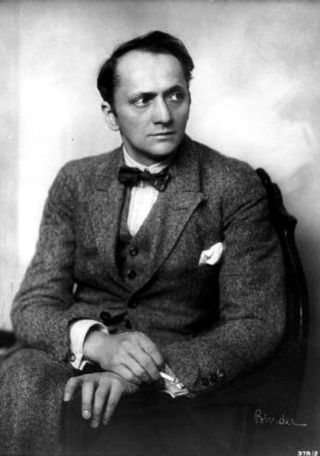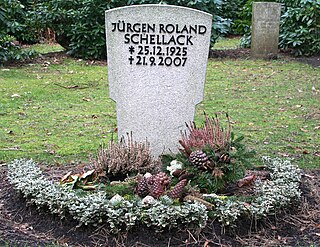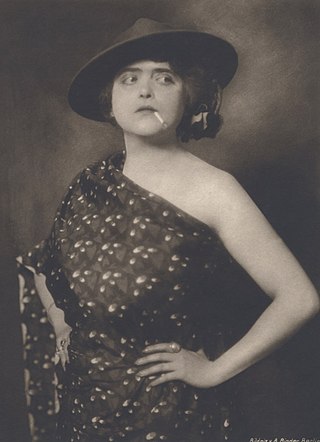
Thea Gabriele von Harbou was a German screenwriter, novelist, film director, and actress. She is remembered as the screenwriter of the science fiction film classic Metropolis (1927) and for the 1925 novel on which it was based. von Harbou collaborated as a screenwriter with film director Fritz Lang, her husband, during the period of transition from silent to sound films.

Gustav von Wangenheim was a German actor, screenwriter and director.

Theodor August Konrad Loos was a German actor.

Jürgen Roland, born Jürgen Schellack was a German film director. Roland was described as the "father of German TV crime shows". He directed about 80 TV productions and 30 movies.

Lucie Höflich was a German actress, teacher and head of the Staatliche Schauspielschule in Berlin. In 1937 she was named the Staats-Schauspielerin and in 1953 she was awarded the Bundesverdienstkreuz.

Gertrude Welcker was a German stage and silent film actress. She appeared in 64 films between 1917 and 1925.

Hertha von Walther was a German film actress. She appeared in 80 films between 1921 and 1983.

Lady Hamilton is a 1921 German silent historical film directed by Richard Oswald and starring Liane Haid, Conrad Veidt and Werner Krauss. The film depicts the love affair between the British Admiral Lord Nelson and Lady Emma Hamilton. It was based on two novels by Heinrich Vollrath Schumacher. A copy of the film exists in a Russian film archive.

Olga Limburg was a German theater and film actress. She began her artistic career in 1901 with a commitment at the Municipal Theatre of Poznan. Since 1902, she played at several of Berlin's leading theaters including the Tribune, the Metropol Theatre, Berlin Lustspielhaus, the comedy and the Theater am Kurfürstendamm. During the early part of her theater career, Limburg usually played supporting roles. Later she worked in the "comical oldies" plays.

Fritz Delius was a German film actor and theater artist. He played leading parts opposite Henny Porten and Fern Andra in several silent films. After the advent of talkies he shifted his focus to theater. When Adolf Hitler came to power and several restrictions began to be imposed on Jews, Delius emigrated to Switzerland where he continued his theater and film career.

Josef Thomas Peterhans was a German stage and film actor.

White Slave Traffic is a 1926 German silent thriller film directed by Jaap Speyer and starring Rudolf Klein-Rogge, Erich Kaiser-Titz, and Fritz Alberti. When a Berlin nightclub worker moves to Budapest to take up a job that has been arranged for her, she finds herself being kidnapped by white slave traffickers. She is eventually rescued from a brothel in Athens. The film opened with a warning from a group committed to combating white slavery, but the film's sensationalist tone provoked controversy. In Britain it was refused a licence by the British Board of Film Censors although it is possible it had some private screenings. One contemporary review described it as "crude melodrama on an unpleasant subject".

Maria Forescu was an Austro-Hungarian-born Romanian opera singer and film actress. During the silent and talkies era of the German cinema, she appeared in several movies as a supporting actress. When Adolf Hitler came to power, Forescu, like other Jews of that period, was barred from her profession. Living undercover during the later years of World War II, she survived the Holocaust and died in 1947 in East Berlin.

Hedda Vernon was a German actress, screenwriter, and film producer. She was a prominent star of the early Weimar Republic, and had her own film production company.
Els von Eystett was a woman who worked in a public brothel in Nördlingen, Germany, in the late fifteenth century. Els originally worked in the brothel as a kitchen maid and later as a prostitute. Her experiences are documented in the records of a criminal investigation carried out by the city council of Nördlingen between December 1471 and January 1472.
Hubert Moest was a German film director, writer, producer, and actor.

Rosa Porten was a prolific German screenwriter, actress, and director during the silent film era.

Lady Godiva is a 1921 German silent historical film directed by Hubert Moest and starring Hedda Vernon and Eduard von Winterstein.

The First Right of the Child is a 1932 German drama film directed by Fritz Wendhausen and starring Hertha Thiele, Eduard Wesener and Helene Fehdmer.

Rose Liechtenstein was a German theater and film actress during the silent film era. She was also credited as Rose Lichtenstein.


















